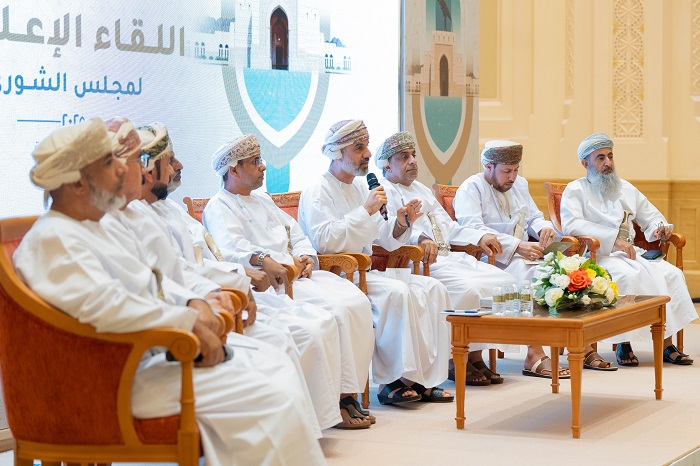
Muscat: The Shura Council held its annual media meeting on Wednesday for the year 2025, with wide participation from representatives of media institutions in the Sultanate of Oman and individuals interested in the Council’s affairs.
The meeting comes as part of the Council’s ongoing efforts to enhance communication with various media outlets and to reaffirm its commitment to strengthening cooperation with all segments of society, underscoring its role as an active partner in the national development process.
The meeting began with a speech delivered by Khalid Humaid Al Maawali, Chairman of the Shura Council, who welcomed the attending media representatives and specialists, affirming that the Council operates within clear competencies that contribute to advancing Oman’s development process and strengthening its legislative framework in line with national visions and aspirations.
He stressed that partnership in national decision-making form the foundation of the Council’s relationship with the Council of Ministers, and are reflected in its work with the State Council in pursuit of the public good.
He further stated that the media and journalists serve as the true mirror reflecting the importance and role of the Shura institution, expressing appreciation for their significant efforts in covering the Council’s discussions and conveying the nation’s issues.
He emphasised that the annual media meeting reflects the Council’s deep trust in media professionals and its keenness to keep them informed through data and comprehensive indicators of the Council’s work.
He concluded by affirming that the Council continues to monitor social issues and remains committed to presenting recommendations that help address social and economic challenges facing citizens.
Following that, Ahmed Mohammed Al Nadabi, Secretary-General of the Shura Council, delivered a visual presentation outlining the Council’s legislative and oversight mandates as stipulated in the Basic Law of the State and the Law of the Council of Oman.
The presentation also showcased the Council’s performance indicators and achievements during the first half of the tenth term, covering the first and second annual sessions.
He stated that the Council held 26 regular sessions during the first half of the current term, during which it discussed several draft laws, oversight tools, and ministerial statements from various service ministries, including the Ministries of Education; Heritage and Tourism; Housing and Urban Planning; Commerce, Industry and Investment Promotion; Economy; Agriculture, Fisheries and Water Resources; Information; and the Ministry of Higher Education, Research and Innovation.
In the legislative field, he noted that the Council completed 14 draft laws, 13 of which were promulgated by Royal Decrees.
Among the most notable are the Law on Combating Wildlife Trafficking, the Law on Deposit Protection, the Media Law, the Financial Law, the Law on Special Economic Zones and Free Zones, the Electronic Transactions Law, the Public Health Law, the Law on Organ and Human Tissue Transplantation, the Income Tax Law, the Law on Collection of State Revenues, the Anti-Human Trafficking Law, the Real Estate Regulation Law, and the Law on the Rights of Persons with Disabilities.
He added that during the first and second annual sessions of the current term, the Council submitted around 466 oversight tools, including questions, requests for clarification, and urgent statements on various national issues.
Meanwhile, the standing committees held more than 211 meetings, addressing 255 topics.
The Council also maintained an active presence in the field of parliamentary diplomacy, participating in more than 67 regional and international events.
During his remarks, the Secretary-General highlighted the Council’s commitment to strengthening public awareness, communication, and societal partnership.
He added that the annual media meeting provides a platform for transparency and dialogue with the media, contributing to the effective transmission of the Council’s message to society.
The meeting also featured extensive discussions and constructive interactions with media representatives, covering various aspects of the Council’s legislative and oversight work.
Participants explored ways to enhance communication channels with media institutions to promote transparency and ensure the public has access to accurate information about the Council’s activities.
Heads of the Council’s standing committees also took part in the discussions, providing explanations on the committees’ roles in reviewing draft laws, examining government agreements, and monitoring the implementation of national programs and development plans through various parliamentary tools.
They further highlighted the committees’ efforts in studying legislative proposals and hosting competent authorities to discuss national priority issues.
Media representatives raised several questions regarding the Council’s working methodology, its oversight tools, and its role in discussing national files related to service, social, and economic sectors.
The session also addressed institutional coordination mechanisms between the Shura Council and government entities within the framework of national governance, reinforcing complementarity between the legislative and executive branches within their respective jurisdictions.
The event included an accompanying exhibition showcasing the Council’s key achievements during the first half of the tenth term.
Attendees were briefed on data and indicators reflecting the Council’s efforts in legislative review and its focus on issues relevant to citizens.
This meeting is part of the Shura Council’s continuous efforts to strengthen partnerships and communication with the media, ensuring transparency in providing information about its legislative and oversight roles, highlighting the accomplishments of its standing committees, and raising public awareness about the Council’s role and its complementarity with the State Council within the Council of Oman — all in service of the national interest.